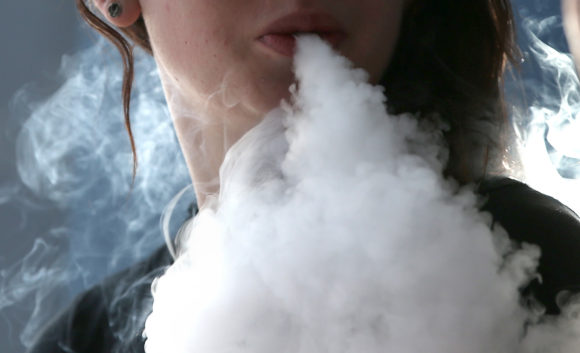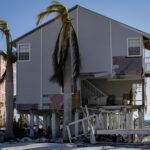Washington is joining several other states in banning the sale of flavored vaping products amid concern over the mysterious lung illness that has sickened hundreds of people and killed about a dozen across the country.
Gov. Jay Inslee signed an executive order Friday asking the state Board of Health to issue the emergency rule at its next meeting, scheduled for Oct. 9. The ban, initially slated to last four months but which could be renewed, will apply to products containing nicotine as well as the cannabis extract THC. It would not apply at tribal shops, but the governor’s office said the administration is reaching out to tribal governments for their cooperation.
“We need to act for the public health of our people,” said Inslee, a Democrat. “I’m confident this executive order will save lives.”
President Donald Trump has said he plans to ban flavored vaping products nationally. The vaping industry has been heavily criticized for marketing flavors such as vanilla and mango that could appeal to kids.
New York, Michigan and Rhode Island are among the states that have announced at least temporary bans. Officials in Oregon and California have urged consumers to stop using them. Massachusetts has gone the farthest, issuing a four-month ban on all vaping products, flavored or not.
More than 800 cases of the illness have been reported across the U.S. The Centers for Disease Control and Prevention said Friday that its investigation into the outbreak is increasingly focused on products that contain the marijuana compound THC.
Public health officials have long been alarmed about big increases in youth vaping – the segment of Washington high school seniors who reported vaping jumped from 20% to 30% from 2016 to 2018 – because they say exposure to nicotine at a young age increases the likelihood of long-term addiction and other problems. Across the country, they have seized on the illnesses as a way to crack down on vaping’s appeal to youth by calling for flavor bans, though it’s not clear whether the flavors have anything to do with the lung injuries.
“Although there is much we do not know about the health effects of e-cigarette use and vaping, what we do know is not good,” said Jeff Duchin, the health officer for Public Health Seattle and King County.
Inslee’s order said the ban is necessary because even if a vaping ingredient or compound were conclusively linked to the illnesses, the state would have no way to identify which products contain the substance so they could be removed from store shelves. There are about 4,000 stores in the state that sell nicotine vaping products, and there are about 480 licensed marijuana retailers who also may sell THC vaping devices or cartridges.
One vape shop owner, Shaun D’Sylva, repeatedly interrupted Inslee’s news conference in Seattle Friday to accuse him of misrepresenting the issue. D’Sylva, who runs Fatboy Vapors in Silverdale, said he and other vape-product vendors are interested in helping people stop smoking tobacco, but that Inslee’s action would cripple them.
Flavored vaping products make up about 85 percent of his sales, he said after the news conference.
“Is the governor going to say, `We’re going to buy your inventory?'” D’Sylva said. “When the smoking rate goes up in 24 months I’m going to be sadly saying I told you so.”
Inslee criticized the industry: “Their interest is in making money. Our interest is in protecting the health of our children,” he said.
This week, Juul Labs, the San Francisco-based company that controls about 70% of the vaping market, announced it is replacing its CEO and will no longer run TV, print or digital advertisements for its e-cigarettes. The company also promised not to lobby against a proposed U.S. ban on flavors.
The governor said he would like to do more about the public health threat posed by vaping, but he said the state’s authority to do so without further legislation was uncertain. He said he is asking lawmakers to clarify the authority of the secretary of health to ban products amid a public health crisis even if a specific cause remains unknown.
He also wants lawmakers to put the flavored vape product ban on the books, so that it can’t easily be undone should the Board of Health’s membership change, and to require all ingredients in vaping products to be disclosed to consumers.
Symptoms of the vaping illness can include chest pain, nausea, vomiting, diarrhea, fatigue, fever and weight loss.
Related:
- New York Could Add Menthol to Flavor Ban as Vaping Groups Sue
- Vaping Now Linked to 12 Deaths, 805 Illnesses in U.S.
- How Early Signs of Lung Effects of Vaping Were Missed and Downplayed
Topics Legislation Washington
Was this article valuable?
Here are more articles you may enjoy.



 JPMorgan Client Who Lost $50 Million Fortune Faces Court Setback
JPMorgan Client Who Lost $50 Million Fortune Faces Court Setback  Florida Public Adjuster, Renter Charged With Filing Claim on Rental Home
Florida Public Adjuster, Renter Charged With Filing Claim on Rental Home  Harvard Study Again Stirs the Pot on Demotech Ratings of Florida Carriers
Harvard Study Again Stirs the Pot on Demotech Ratings of Florida Carriers  If US Inflation Reflected Rising Home Insurance Costs, It’d Be Even Higher
If US Inflation Reflected Rising Home Insurance Costs, It’d Be Even Higher 

